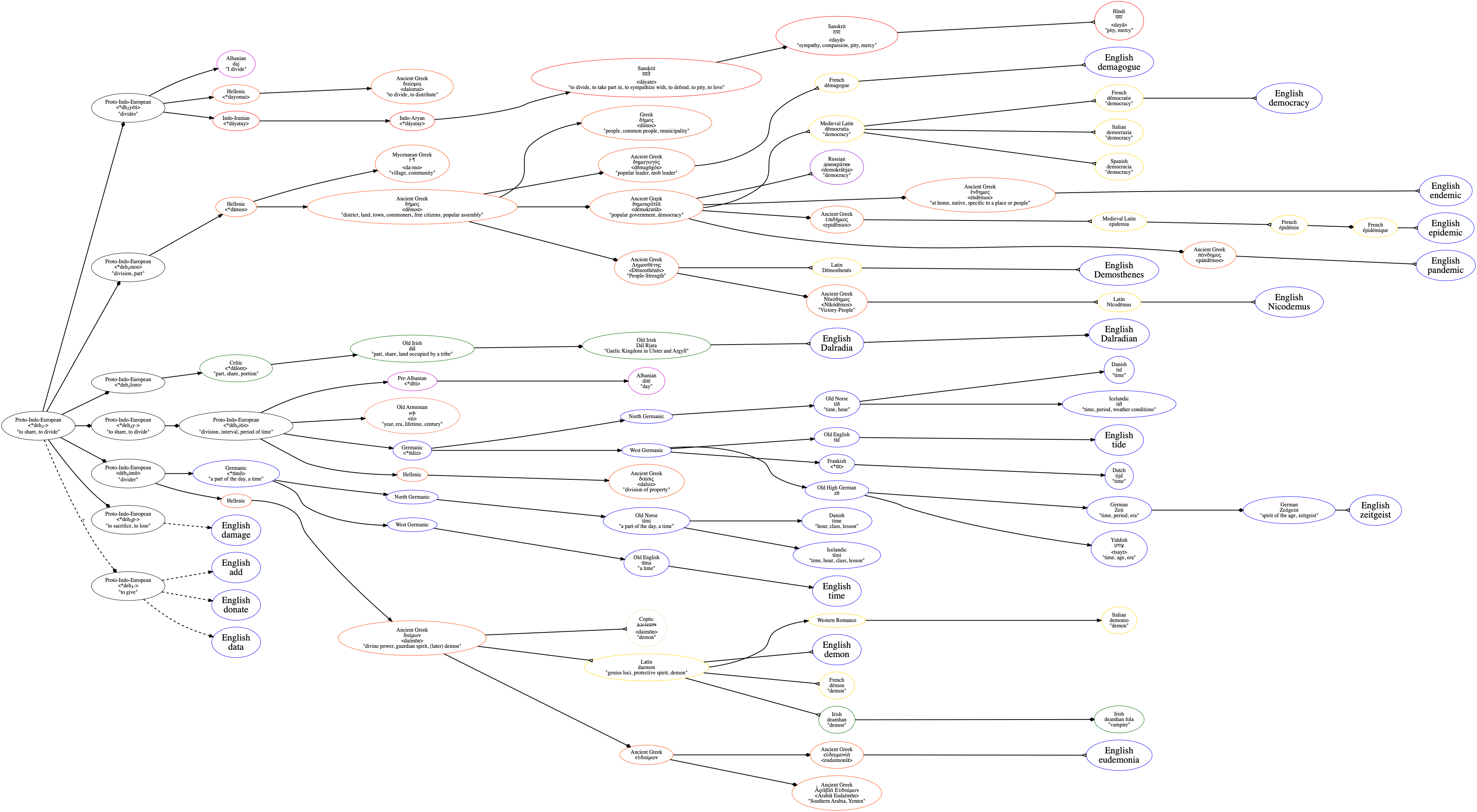Theme: 🦠
Introduction
Demon Pandemic Zeitgeist Time
Teaser
democracy, pandemic, zeitgeist, time, demon
Full Text
-
Proto-Indo-European *deh₂- to share, to divide
-
Proto-Indo-European *dh₂yéti divides
- Albanian daj I divide
-
Hellenic *dayomai
- Ancient Greek δαίομαι daíomai to divide, to distribute
-
Indo-Iranian *dáyatay
-
Indo-Aryan *dáyatay
-
Sanskrit दयते dáyate to divide, to take part in, to sympathize with, to defend, to pity, to love
-
Sanskrit दया dayā sympathy, compassion, pity, mercy [1]
- Hindi दया dayā pity, mercy
-
-
-
-
Proto-Indo-European *deh₂mos division, part
-
Hellenic *dāmos
- Mycenaean Greek 𐀅𐀗 da-mo village, community
-
Ancient Greek δῆμος dêmos district, land, town, commoners, free citizens, popular assembly
- Greek δήμος dímos people, common people, municipality
-
Ancient Greek δημαγωγός dēmagōgós popular leader, mob leader
-
French démagogue
- English demagogue
-
-
Ancient Greek δημοκρᾰτῐ́ᾱ dēmokratíā popular government, democracy
-
Medieval Latin dēmocratia democracy
-
French démocratie democracy
- English democracy
- Italian democrazia democracy
- Spanish democracia democracy
-
- Russian демокра́тия demokrátija democracy
-
Ancient Greek ἔνδημος éndēmos at home, native, specific to a place or people
- English endemic
-
Ancient Greek ἐπιδήμιος epidḗmios
-
Medieval Latin epidemia
-
French épidémie
-
French épidémique
- English epidemic
-
-
-
-
Ancient Greek πάνδημος pándēmos
- English pandemic
-
-
Ancient Greek Δημοσθένης Dēmosthénēs People-Strength personal name
-
Latin Dēmosthenēs
- English Demosthenes
-
Ancient Greek Νῑκόδημος Nīkódēmos Victory-People personal name
-
Latin Nīcodēmus
- English Nicodemus
-
-
-
-
Proto-Indo-European *deh₂lom
-
Celtic *dālom part, share, portion
-
Old Irish dál part, share, land occupied by a tribe
-
Old Irish Dál Riata Gaelic Kingdom in Ulster and Argyll
-
English Dalradia
- English Dalradian
-
-
-
-
-
Proto-Indo-European *deh₂y- to share, to divide
-
Proto-Indo-European *déh₂itis division, interval, period of time
-
Pre-Albanian *dīti
- Albanian ditë day
- Old Armenian տի ti year, era, lifetime, century
-
Germanic *tīdiz
-
North Germanic
-
Old Norse tíð time, hour
- Danish tid time
- Icelandic tíð time, period, weather conditions
-
-
West Germanic
-
Old English tīd
- English tide
-
Frankish *tīt
- Dutch tijd time
-
Old High German zīt
-
German Zeit time, period, era
-
German Zeitgeist spirit of the age, zeitgeist equiv. to "tide-ghost"
- English zeitgeist
-
- Yiddish צײַט tsayt time, age, era
-
-
-
-
Hellenic
- Ancient Greek δαῖσις daîsis division of property
-
-
-
Proto-Indo-European déh₂imō divider
-
Germanic *tīmô a part of the day, a time
-
North Germanic
-
Old Norse tími a part of the day, a time
- Danish time hour, class, lesson
- Icelandic tími time, hour, class, lesson
-
-
West Germanic
-
Old English tīma a time
- English time
-
-
-
Hellenic
-
Ancient Greek δαίμων daímōn divine power, guardian spirit, (later) demon [2]
- Coptic ⲇⲁⲓⲙⲱⲛ daimōn demon
-
Latin daemon genius loci, protective spirit, demon
-
Western Romance
- Italian demonio demon
- English demon
- French démon demon
-
Irish deamhan demon
- Irish deamhan fola vampire lit. "blood demon"
-
-
Ancient Greek εὐδαίμων
-
Ancient Greek εὐδαιμονίᾱ eudaimoníā
- English eudemonia
- Ancient Greek Ᾰ̓ρᾰβῐ́ᾱ Εὐδαίμων Arabíā Eudaímōn Southern Arabia, Yemen [3]
-
-
-
-
Proto-Indo-European *deh₂p- to sacrifice, to lose
- English damage
-
Proto-Indo-European *deh₃- to give
- English add
- English donate
- English data
-
Visual
Collected English words
demagogue, democracy, endemic, epidemic, pandemic, Demosthenes, Nicodemus, Dalradia, Dalradian, tide, zeitgeist, time, demon, eudemonia, damage, add, donate, data
Footnotes
-
^
You could imagine Japanese 同情 dōjō: "sympathy" coming from Sanskrit दया dayā: "sympathy, compassion, pity, mercy", via Buddhism, but it's not. It's standard Sino-Japanese from Middle Chinese 同情 duŋ-d͡ziᴇŋ.
-
^
Ancient Greek δαίμων daímōn: "divine power, guardian spirit, (later) demon" via the idea of "one who dispenses, one who allots". Compare Old Persian 𐏎 baga: "god" from *bʰeh₂g-: "to divide, to distribute".
It can seem more related to the meaning of *deh₃-: "to give", the phonetics clearly align it with *deh₂-. This semantic blurring lends weight to the idea that *deh₂-: "divide" and *deh₃-: "give" have a Pre-Proto-Indo-European relationship.
-
^
Ancient Greek Ᾰ̓ρᾰβῐ́ᾱ Εὐδαίμων Arabíā Eudaímōn: "Southern Arabia, Yemen", literally "Prosperous Arabia", calqued into Latin as Arabia Felix.
